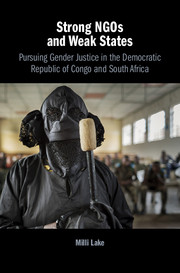 Strong NGOs and Weak States
Strong NGOs and Weak States Book contents
- Strong NGOs and Weak States
- Strong NGOs and Weak States
- Copyright page
- Contents
- Illustrations
- Preface
- Acknowledgments
- Translation of Key Foreign Terms
- Maps
- Part I
- 1 Law in Unforeseen Places
- 2 Researching Violence, Law, and Human Rights in South Africa’s Western Cape and DR Congo’s Eastern Provinces
- 3 Explaining State-Level Policy and Practice
- 4 Local Justice Institutions and Opportunities Created by State Fragility
- 5 Ordinary Women in Court
- Part II
- Book part
- Bibliography
- Index
4 - Local Justice Institutions and Opportunities Created by State Fragility
from Part I
Published online by Cambridge University Press: 04 May 2018
- Strong NGOs and Weak States
- Strong NGOs and Weak States
- Copyright page
- Contents
- Illustrations
- Preface
- Acknowledgments
- Translation of Key Foreign Terms
- Maps
- Part I
- 1 Law in Unforeseen Places
- 2 Researching Violence, Law, and Human Rights in South Africa’s Western Cape and DR Congo’s Eastern Provinces
- 3 Explaining State-Level Policy and Practice
- 4 Local Justice Institutions and Opportunities Created by State Fragility
- 5 Ordinary Women in Court
- Part II
- Book part
- Bibliography
- Index
Summary
- Type
- Chapter
- Information
- Strong NGOs and Weak StatesPursuing Gender Justice in the Democratic Republic of Congo and South Africa, pp. 100 - 151Publisher: Cambridge University PressPrint publication year: 2018


